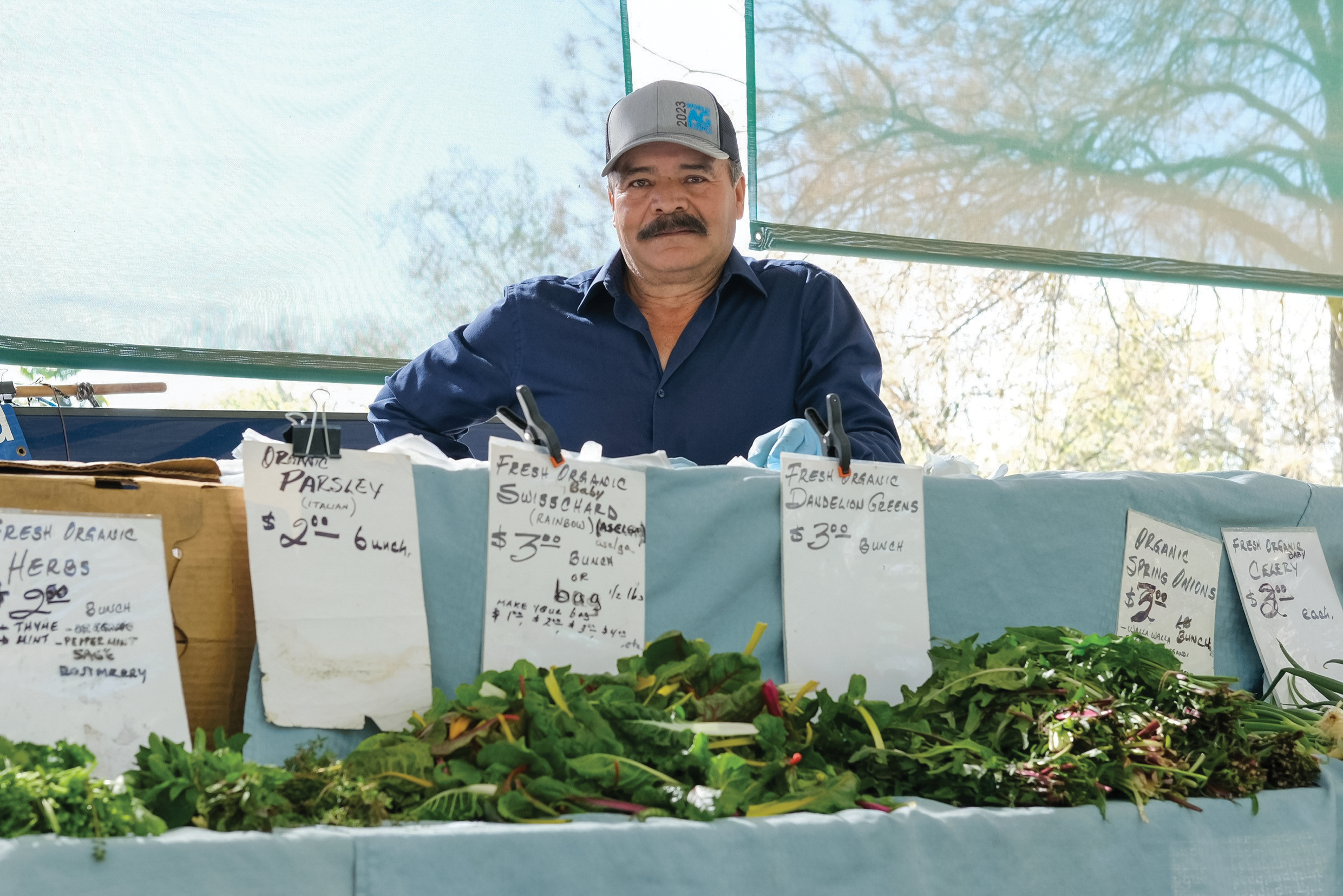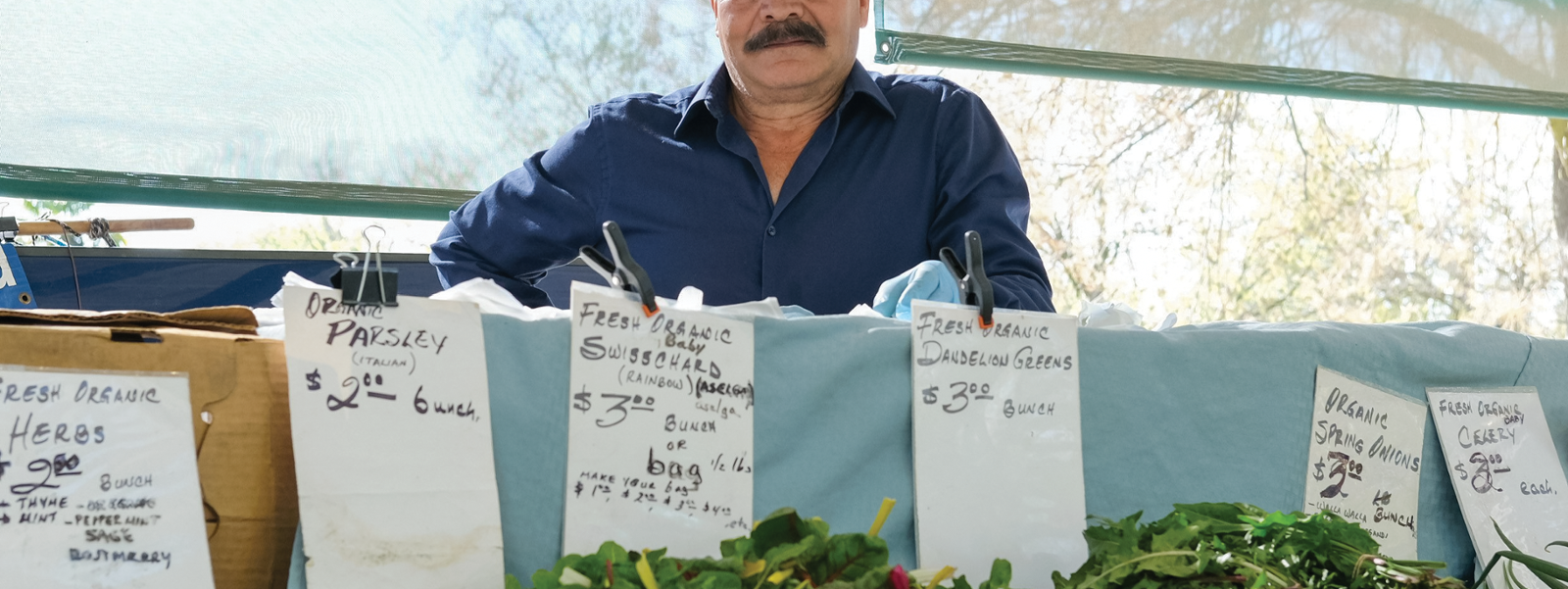Storms deal double blow to small farmers

Storms that battered farms across California took an especially harsh toll on small organic farmers.

Federico Toledo, selling produce at the Davis Farmers Market in Yolo County, had fewer offerings after flooding left 8 acres on his 30-acre farm in San Joaquin County underwater. He says this year’s storms also reduced attendance at Sacramento-area farmers markets.
Photo/Caleb Hampton
By Caleb Hampton
Storms that battered farms across California took an especially harsh toll on small organic farmers who rely on farmers markets to sell their produce. In addition to damaging crops, the atmospheric rivers shuttered outdoor markets and discouraged customers, resulting in reduced sales.
“I lost a lot of crops,” said Federico Toledo of Toledo Farms in San Joaquin County. “The heavy rains just flooded everywhere.”
The floods killed some of Toledo’s younger persimmon, apricot and nectarine trees and drowned 4 acres of lettuce, broccoli, cauliflower and spring onions. “It was incredible,” he said, pulling up photos of a field of leafy greens resembling a pond.
Parts of Toledo’s 30-acre organic farm are still underwater. “There’s 8 acres where we can’t do anything because it’s still wet,” he said. “We tried a couple times, but my tractor got stuck.”
Toledo isn’t alone. Carine Hines, farm business advisor for Kitchen Table Advisors, said some farms the group works with in Yolo, Solano and Sacramento counties lost crops to January flooding. “Then, in March, they lost it all again,” she said.
For small farms, it can be especially hard to weather such setbacks. “They might not have as much cash in the bank,” Hines said. Unlike larger growers who have multiple fields or ranches, when a small farm floods, it can lose everything, she added.
Andrew Walker, who runs the 3-acre Farmboy Organics farm in Yolo County with twin brother Eric, said they had “barely any flooding.” Yet the cold winter slowed the growth of crops such as spinach, carrots and beets. “Last year, we were harvesting the crops already,” Walker said. “This year, they’re a few weeks away still.”
Across the Sacramento Valley, organic farmers reported harvest and planting delays, which will be felt for months.
“Normally, there are windows in January and February where we can get in and plant, but the storms came one after another,” said Paul Muller of Full Belly Farm, a 400-acre organic farm in Yolo County’s Capay Valley. “We weren’t able to get a lot of seed in the ground, so we’re going to see some gaps in production.”
This past winter, crop losses and production gaps resulted in slim vegetable selections at farmers markets. “We wish we had more to bring,” Toledo said. But what he did bring, he struggled to sell.
“The markets are slower,” he said, referring to the Davis Farmers Market and others in Sacramento where he sells fresh produce every week.
At the Napa Farmers Market, attendance dropped by two-thirds on rainy days this winter, according to Hines of Kitchen Table Advisors, who serves as vice president of the Napa Farmers Market Association.
“Across California, there were markets canceled left and right,” she said. “Every single farmer that was supposed to go to markets but couldn’t—or had less customers—is feeling that.”
Before the pandemic, Toledo employed 19 people. He had to let all but three of them go as farmers markets faced temporary closures or diminished attendance. He has yet to scale up his operation again.
Despite such challenges, small organic farmers in the Sacramento Valley said they have high hopes for a productive year, with the wet winter providing ample water for crops and warm weather bringing more people out to markets.
“I think it will be a good year because we have enough water,” said Toledo, who fallowed half his acreage due to drought over the past two years. Now, he said, “we are planning to plant everything. Maybe it will be a little late, but we are putting more stuff in this year.” This month, Toledo is busy planting heirloom tomatoes and peppers.
For organic farmers who rely on cover crops to provide soil fertility, the rain has been vital. At Farmboy Organics, the Walker brothers use a mix of peas, oats, vetch and bell beans to fix carbon and nitrogen and improve soil conditions for their main crops.
“Through this winter, that was our only fertility,” Walker said. “Our cover crops were 2 inches tall in December. Now, I’ve actually mowed most of it. They were 4 feet tall, flowering and gorgeous.”
At Full Belly Farm, “some of the fields are completely white with radish and yellow with mustard,” Muller said. “There’s a huge number of insects and bees foraging these covers crops. We think we’re going to see really good soil benefits this year.”
Still, the unusually wet weather could test organic farmers, who are especially wary of pests and diseases this year.
Annie Main of Good Humus Farm, an organic farm in Yolo County, recently found brown rot in some of her apricot trees for the first time in three years. “It comes with wet, humid weather,” she said.
While pests and diseases impact all farmers, “conventional growers have a broader selection of pesticides and fungicides,” said Hines, who has a small organic farm in Capay Valley. “And usually, the chemicals they use are much more effective.”
But on the whole, organic farmers in the Sacramento Valley said they anticipate a bountiful summer harvest, perhaps even more than the market can handle. “I think there’s a good chance that all of a sudden the market’s going to be flooded,” Hines said.
Whatever the case, Walker of Farmboy Organics said, “I think it’s all going to work out. We just have to keep going.”
(Caleb Hampton is an assistant editor for Ag Alert. He may be contacted at champton@cfbf.com.)




